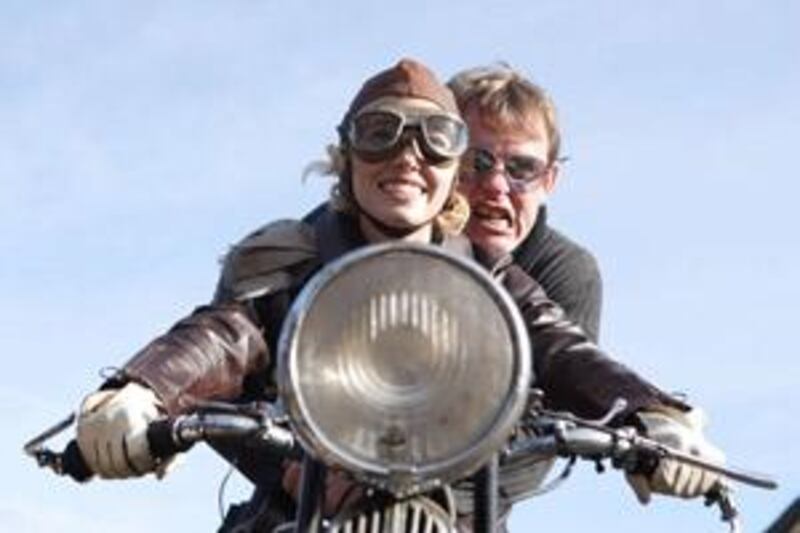The Cole Porter and Noël Coward jazz-age tracks fly suitably thick and fast on the soundtrack to this 1924-set dramedy. A bit of Let's Misbehave here, a bit of Mad Dogs and Englishmen there. A bit of Makin' Whoopee over there.
Then, about two-thirds into the film, you start to notice anachronistic music. The Tom Jones pop standard Sexbomb, for one, pulses happily in the background of fox hunts, tea parties and country house shenanigans, only this time it's done in disguise, with the same Porter-ish jazz inflections as the other tunes. It is followed swiftly by Billy Ocean's When the Going Gets Tough, the Tough Get Going, previously used in the 1985 Michael Douglas action hit The Jewel of the Nile, but here again, appropriately aged by the hard brass flapper stylings of the era.
That these songs never quite ignite or move beyond musical curios on a soundtrack otherwise loyal to the period reflects a nagging sense of compromise that often slows the movie in its tracks. It is directed by Stephan Elliott, who proved in his 1994 smash The Adventures of Priscilla, Queen of the Desert that he is keenly aware of the transformative power of a good pop tune. Yet here he seems hesitant and unsure of whether to load his soundtrack with contemporary gems (therefore letting his cast in on the joke) or simply to drop the two modern oddities in the background (perplexing his audience as much as entertaining it).
Perhaps it's the source material that intimidates. Elliott has chosen an early Coward play that it is littered with the writer's trademark bons mots and full of scabrous and unusually anti-English insights into the corrosive nature of the British class system (Coward was going through a pro-American phase when he wrote the play). An adaptation of Easy Virtue is a monumental task for any writer-director. But for Elliott, coming off the post-Priscilla flops Welcome to Woop Woop and Eye of the Beholder, the challenge has produced a respectful assimilation of Coward where innovation was clearly required.
Thus we are presented with a narrative that revolves around a sweet but dim English heir called John Whittaker (Ben Barnes) and his older and wiser American bride, Larita (Jessica Biel). Larita is a motor car racer, a winner of the Monaco Grand Prix and, in the eyes of John's possessive mother, Mrs Whittaker (Thomas), a hugely unsuitable love match. In the days after John and Larita arrive at the family pile, a series of increasingly fractious comedy set pieces test the mettle of both women - and the love of this increasingly equivocal heir. Larita, a prototype feminist and no-nonsense American, takes a motorbike on a fox hunt. She accidentally talks John's sister Hilda (Kimberley Nixon) into exposing herself at a local amateur revue, and she crushes the Whittaker family's beloved pet Chihuahua in a freak sofa-sitting accident. The latter incident, unfortunately, produces a lot of physical slapstick (where do you hide a dead chihuahua?) that might have seemed vital on paper but mostly jars with the rest of the movie's sedate tone.
Of course, this being Coward with a first-rate cast, there are some genuinely intriguing turns. Thomas's matriarch is a fascinating study in withered ambition. She is a woman whose love for her son turns out to be, in the satisfying revelation, based on complex emotions rather than Oedipal pampering. The actress clearly relishes knockout lines delivered at Biel's outclassed seductress. Colin Firth, too, as the jaded, disillusioned Mr Whittaker, has a steady supply of pithy put-downs. "I don't feel like smiling," complains Mrs Whittaker as John and Larita approach for the first time.
"You're English, dear. Fake it," Mr Whittaker deadpans. Of course, nice lines alone never saved a movie, and too often in Easy Virtue they appear to be crutches for a film in search of a narrative voice or a coherent vision. That the film lacks both of these and is still reasonably entertaining is a testament to the source material and to Elliott's unobtrusive directorial presence. That it could have been so much more is obvious from the little hints of virtuosity (in both performance and music) that nearly break through the dutiful business of adaptation.





